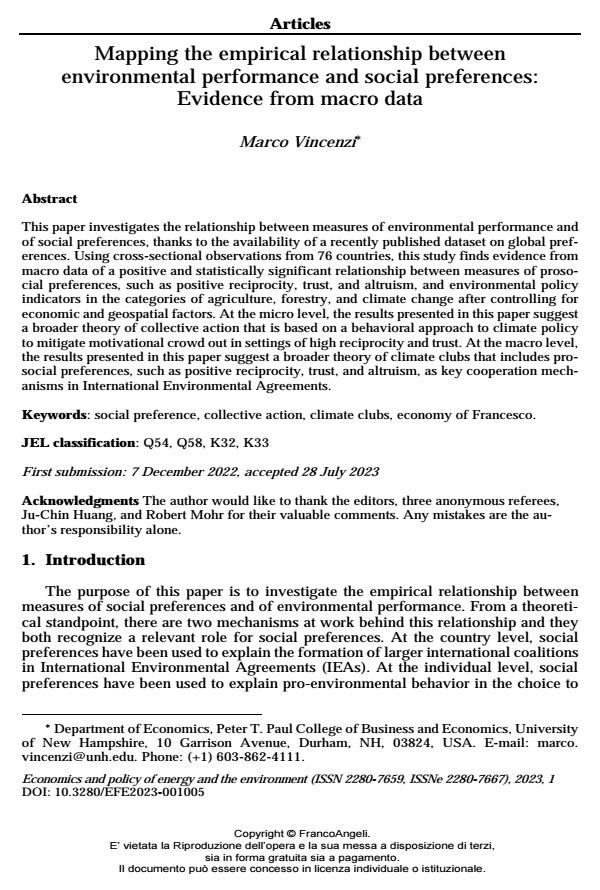Mapping the empirical relationship between environmental performance and social preferences: Evidence from macro data
Titolo Rivista ECONOMICS AND POLICY OF ENERGY AND THE ENVIRONMENT
Autori/Curatori Marco Vincenzi
Anno di pubblicazione 2023 Fascicolo 2023/1
Lingua Inglese Numero pagine 18 P. 85-102 Dimensione file 161 KB
DOI 10.3280/EFE2023-001005
Il DOI è il codice a barre della proprietà intellettuale: per saperne di più
clicca qui
Qui sotto puoi vedere in anteprima la prima pagina di questo articolo.
Se questo articolo ti interessa, lo puoi acquistare (e scaricare in formato pdf) seguendo le facili indicazioni per acquistare il download credit. Acquista Download Credits per scaricare questo Articolo in formato PDF

FrancoAngeli è membro della Publishers International Linking Association, Inc (PILA), associazione indipendente e non profit per facilitare (attraverso i servizi tecnologici implementati da CrossRef.org) l’accesso degli studiosi ai contenuti digitali nelle pubblicazioni professionali e scientifiche.
This paper investigates the relationship between measures of environmental performance and of social preferences, thanks to the availability of a recently published dataset on global pref- erences. Using cross-sectional observations from 76 countries, this study finds evidence from macro data of a positive and statistically significant relationship between measures of proso- cial preferences, such as positive reciprocity, trust, and altruism, and environmental policy indicators in the categories of agriculture, forestry, and climate change after controlling for economic and geospatial factors. At the micro level, the results presented in this paper suggest a broader theory of collective action that is based on a behavioral approach to climate policy to mitigate motivational crowd out in settings of high reciprocity and trust. At the macro level, the results presented in this paper suggest a broader theory of climate clubs that includes pro- social preferences, such as positive reciprocity, trust, and altruism, as key cooperation mech- anisms in International Environmental Agreements.
Parole chiave:social preference, collective action, climate clubs, economy of Francesco.
Jel codes:Q54, Q58, K32, K33
Marco Vincenzi, Mapping the empirical relationship between environmental performance and social preferences: Evidence from macro data in "ECONOMICS AND POLICY OF ENERGY AND THE ENVIRONMENT" 1/2023, pp 85-102, DOI: 10.3280/EFE2023-001005